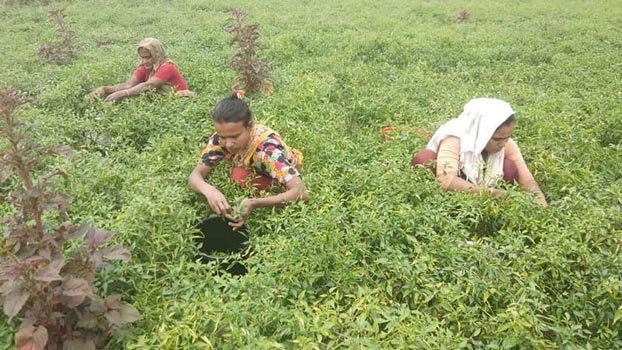Agricultural women victims of wage discrimination in Kishoreganj


Of the 21 steps of farming in Kishoreganj district, women work in 17. Yet they could not be farmers or peasants. They are suffering from wage discrimination despite more work than men. From morning to evening, a woman working on land making mud land receives only Tk 200-300. There, a male farmer gets tk 400-500 less than the work of the woman.
Meanwhile, the leaders of the Bangladesh Mohila Parishad Kishoreganj Unit have demanded equal wages for women farmers. Rabia Khatun said that both my husband and I worked in other's fields as agricultural laborers. But my husband got 400 taka but I got only 200 taka. In addition to men, women also join in the work to overcome the financial strain on low income families.
According to sources, the Department of Agriculture Extension has undertaken many tasks, from pre-harvesting to harvesting, seed harvesting, processing and marketing. But this calculation is not recognized in the institutional statistics. Farming is considered as part of the daily routine of women. It is considered a wageless job for them. As a result, women are free to work in the agricultural sector for 45.6 percent.
According to the survey, the number of labor force employed in agriculture in the country is 2 crore 56 lakh. Of these, about 1 crore 5 lakh are women. A decade ago, the number of women was 38 lakh. That is, 67 lakh women have been involved in farming in 10 years. And the male participation has decreased by three and a half percent.
On the other hand, the Bangladesh Bureau of Labor Statistics (BBS) says in the survey of Bangladesh labor force, about 70 lakh women have become involved in agriculture in 10 years. Demand for women workers has increased due to the division of labor at different stages of agriculture. Most men are changing occupations and engaging in non-farming. Or leaving the village and moving to the city. This report particularly reflects the area of Hoar.
According to information sources, not only the land is ready, the women of Kishoreganj are involved in various activities including cutting of paddy, planting paddy, drying paddy, paddy cultivation, cultivating vegetables, cultivating cows and goats. In the absence of males, females of the main family live mainly through farming. They do all the work of production, processing and marketing together. Sufferings are higher, work hours are longer but wages are lower. Even after all this, they are not getting any recognition for their contribution to agriculture.
Bangladesh Mohila Parishad Kishoreganj Unit President Advocate Maya Bhowmik said that in the national agricultural policy, specific definitions of women farmers should be given as a "farmer" and that women should be given specific direction to receive agricultural commodity services. They have to reach out to all agricultural data.
Besides providing technical training, appropriate public-private initiatives should be taken to encourage the participation of rural women in the market system. She said that, local level landowners should make arrangements to force women farmers to pay fair wages.
It is also important to set up women farmers' organizations on the field. This helps women prevent the uptake of their families. But outside women do not have work environment, they are not getting a fair wage. Somewhere around half of men are paid their wages. Many abuses of landowners also have to be endured.


